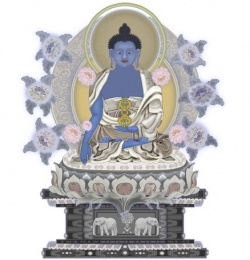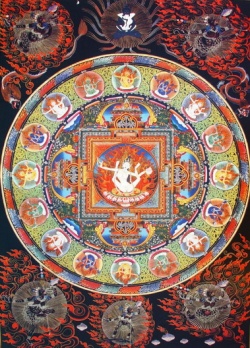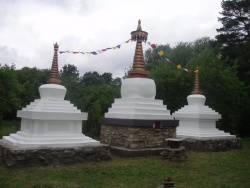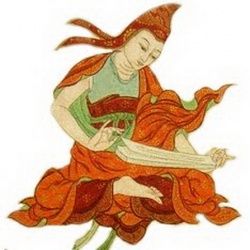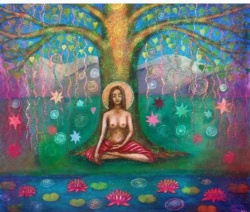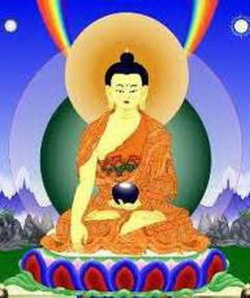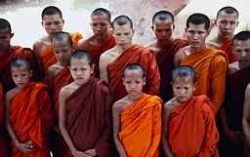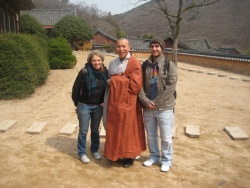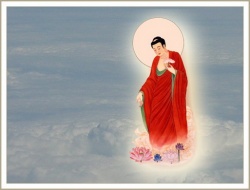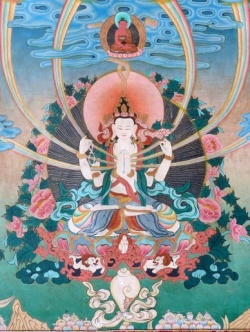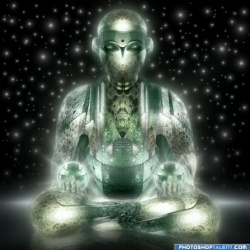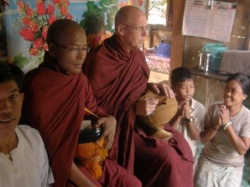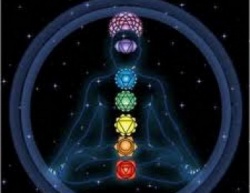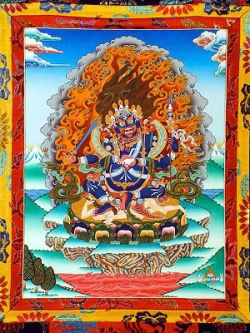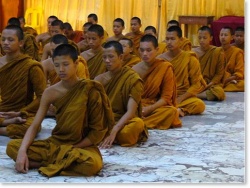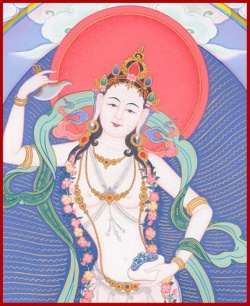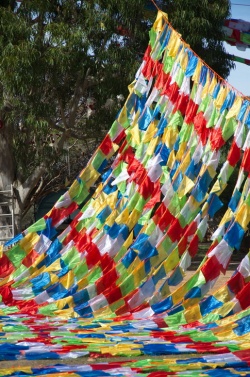The Ekayana Sudden School and a Harmonious Society
By Master Yang Foxing
(Translators’ note: Quotations from The Sixth Patriarch’s Sutra in this article are based on the English versions translated respectively by The Buddhist Text Translation Society, by Mr. Huang Maolin, and by Mr. Tony K. Lin, and quotations from the Vajra Prajna Paramita Sutra are based on the English version translated by Charles Luk, to which we are greatly indebted.)
Abstract: The Ekayana (Oneyana, or The Supreme Vehicle) Sudden School, based on the realization of the Dharmadhatu-nature, is the most extensive, subtle and profound. Its purport is, one should refrain from deluded thinking, sever private interests, cherish a pure
heart, and help with living beings with great loving-kindness and compassion. This essay discusses the essence of the Ekayana Sudden School, i.e. it is neither a worldly religion nor human philosophy. It illustrates the internal realization of the Ekayana School and
its different stages of practice, pointing out that it both penetrates into the worldly affairs and transcend them as well. Besides, it also expounds on the relationship of the Ekayana School, the traditional Chinese culture and a harmonious society. The essay shows
that the Ekayana School is of great significance to construct a harmonious society.
Key words: the Ekayana Sudden School; purifying the human mind; the Law of Cause and Effect and the Law of Reincarnation According to Karma; purifying the Alaya Vijnana
The new age is changing rapidly. Only the Buddhist truth remains neither produced nor annihilated, and is always penetrative, illuminating and free from any constrains. The so-called world is, in fact, an illusion combined by infinite time and boundless space. Its
phenomena are extremely complicated. Scientists study parts of them; and philosophers observe them generally. However, what they have gained is only a tiny bit of the illusive Law of Cause and Effect! Thus, they fail to penetrate the truth of the world. If there is
anything that can fulfill this purpose, it is Buddhadharma, the ultimate truth for the universe and human life. Buddhist doctrines are abstruse, extensive, subtle and profound. It concerns not only the most important thing for everyone--life and death, but also the
space in which every living being exists. The Buddhist truth provides ceaseless power of Dharma to all sentient beings. As practitioners’ spiritual capacities and stages in practice differ, they get different effects and benefits.
Is Buddhism Religion or Philosophy?
Idealism thinks that mind is the source of things; here, the mind refers to human consciousness. The “material” in Materialism is called worldly phenomenon in Buddhism. Generally speaking, practitioners of ordinary religions, including Buddhists who have not realized
their true nature, are not separate from consciousness. However, the Ekayana Sudden School can penetrate into the Reality and directly reach the origin of the Dharmadhatu. It fully penetrates that worldly phenomena are nothing but shadows of the Reality, and that
consciousness is the tool by which one distinguishes the phenomena and both of them are trivial and insignificant. Therefore, one cannot impose the label of either Idealist or Materialist on practitioners of the Ekayana School who have already penetrated into the
Reality. If one must find out on what doctrine the Ekayana is based, the answer is, in brief, it is the true nature, and in detail, it is the origination of the Six Elements (nature has six kinds of functions).
Besides, in Buddhism there is a doctrine ‘Wan (ten thousand) fa (dharmas, things, matters) wei (only) xin (mind, heart) (All dharmas/things arise from the mind/heart only)’. However, the word ‘xin’ used here actually refers to Alaya Vijnana, different from the ‘xin’
which refers to consciousness (brain) specifically as used in Idealism of philosophy.”
When Shakyamuni Buddha was living in this world, he transformed and delivered sentient beings when conditions arose, giving different teachings to suit people with different spiritual capacities. As the spiritual capacities of sentient beings differed greatly, he
spoke 84,000 Dharma-doors to teach and transform them. At first, he gave the Expedient Teachings and later he taught them the Real Teachings among which the Ch’an (Zen) School and the Esoteric School also belong to the Ekayana Sudden School. As for practitioners of
the Ekayana Sudden School, their comprehension of Buddhist doctrines comes from their actual practice. They focus their spiritual cultivation on actual practice with their comprehension of Buddhist doctrines complementing it. With progress in actual practice, their
comprehension of the teachings will deepen accordingly. The higher stage they attain in actual practice, the better their comprehension will be. Practice without correct comprehension of Buddhist doctrines turns into a worldly religion. Comprehension derived from
practicing worldly religion is like a myth, which cannot stand up to scientific test, so it is not true comprehension. As practitioners of all worldly religions are not free from the Attachment to Self and the Attachment to Things as Realities, conflicts, fights and
even cruel killing arise among different religions. The greatest difference between Buddhism and worldly religion is, Buddhist practitioners must eliminate the Attachment to Self and the Attachment to Things as Realities so as to be enlightened and liberated from the
cycle of life and death. Therefore, the Ekayana Sudden School does not belong to worldly religion. Comprehension of Buddhist teachings without actual practice becomes human philosophy, which does not depart from consciousness. If one depends only on the consciousness
and comprehends Buddhist doctrines through the literal meaning of the scriptures, no matter how eloquent he is and how plausible his explanations may sound, such understanding actually results from making comparison and inference, so it is not the original face of
Buddhism. Therefore, Master Hong Ren, the Fifth Patriarch of the Ch’an School once said, “Speculation is useless.” The Sixth Patriarch also said, “They may combine their efforts to speculate. But the more they speculate, the farther they are from the truth.”
Therefore, the Ekayana Sudden School is neither a human philosophy.
Buddhism differs from both religion and philosophy. It holds that all sentient beings have Buddha nature, and the All Seed Nature of Buddha and sentient beings merge into oneness with each other. The only difference between sentient beings and the Buddha is: the
former is deluded while the latter is completely enlightened. The Buddha can realize the All Seed Nature and apply them flexibly while sentient beings are deluded without realizing it. Science emphasizes experiments and Buddhism stresses actual practice. As for the
process of actual practice, one must experience the following stages. First of all, one should subdue his consciousness. Only when one has subdued the consciousness (the sixth consciousness) and realized the Self Enlightenment Part of the Eighth Consciousness, and
when the eight kinds of consciousness have been subdued and true wisdom has emerged can one internally correspond to the wonderful state of the non-duality of nature and phenomenon. In such state, for the same thing, by means of the senses, one will perceive its
phenomenon; and by means of wisdom, one penetrates its true nature. His wisdom (Prajna) and concentration (Samadhi) are equally developed, and he has corresponded to Prajna Paramita, illuminated to the Reality of Dharmadhatu nature and thoroughly penetrated the Dharma door of the non-duality of nature and phenomenon with its boundless miraculous functions. Only then can he thoroughly penetrate the ultimate truth of the universe and human life.
II.The Ekayana Sudden School and Stages of Practice
Practitioners of the Ekayana Sudden School can internally realize the state in which he experiences the non-duality of nature and phenomenon, the non-duality of emptiness (Sunya) and bliss, and the boundless wonderful happiness. What is called “non-duality of nature
and phenomenon”? Take water for example. Flowing water may be compared to nature and waves phenomenon. Therefore, without water, there will not be waves; waves are water and water is non-dual from waves. What is called “non-duality of emptiness and bliss”? Its
esoteric meaning is that, the purport of Buddha-nature lies in the balanced realization of both wisdom and concentration. The magnificent state will not manifest to one who has wisdom alone but has not attained the state of concentration. However, with concentration
alone and without wisdom, one cannot perform the Dharmadhatu’s innate and flexible functions. If one has reached this state, when contemplating his own heart, he experiences complete tranquility and awakening in which there is the bliss of the merging into oneness of
concentration and wisdom. Concentration, wisdom and Buddha-nature cannot be described by words nor can they be comprehended by one’s consciousness. The nature of things is emptiness (the great element of emptiness) and therefore it is compared to emptiness. When one
has achieved a balance and perfection of wisdom and concentration, he will accordingly achieve the great bliss of unity not by means of sensual pleasure or sexual conduct, but through his internal realizations in practice. What is called “boundless wonderful happiness”
? When Dharma nature flows through the practitioner and empowers and protects him ceaselessly, and when his wisdom has corresponded with concentration, he experiences boundless wonderful happiness. The wonderful nature of Bhutathatata is of complete tranquility, great
bliss, omniscience, and sharpness in penetrating the laws of all things with ceaseless functions. As for the profound doctrines mentioned above, one can only understand them through realization in actual practice. It is just like drinking water, for only the drinker
knows its temperature.
In the beginning, the Seed Nature of Dharmadhatu was without experience. It functioned whenever conditions arose, and thus, manifold phenomena manifested completely. As it became attached to the phenomenon of the world, the omniscient, illuminating and penetrative
Buddha-nature is veiled and defiled by Ignorance. As a result, Dharmadhatu-nature (Buddha-nature) degenerates into Alaya Vijnana, and then Alaya Vijnana into Consciousness. The so-called Buddha-nature in Buddhism is also named All Seed Natures. All Seed Natures
includes the Seed Nature of Buddhas and Bodhisattvas and the Seed Nature of all sentient beings. When one has realized the true Buddha-nature, he can gather and restore all the various phenomena of Dharmas into All Seed Natures, and he can find all the seed natures
merging into oneness. The so-called origination means that the All Seed Nature functioned when conditions arose and thus it degenerated into forms of sentient beings. As the originations differ in terms of the sequence in time, the degrees of defilement also vary.
Those who are less polluted and have little Ignorance are always manifested as intelligent and capable people. They can use wisdom in the mundane world to discover its various laws and even come up with many inventions. Thus, the spiritual civilization and the
material civilization of the mundane world are both closely related to the highest state of Buddhism: the non-duality of nature and phenomenon, the non-duality of emptiness and bliss, and the boundless wonderful happiness.
The achievements that sentient beings spare no effort to make are actually shadows of the True Nature. If one wishes to directly reach the origin of the Dharmadhartu, he must resolve to practice hard and perseveringly and try to achieve internal realization through
practice.
Buddhist practice has its own law, and its gist is explained hereafter.
1. All sentient beings, regardless of their status, have many deep-rooted habits hard to eliminate.
2. The practice of a certain kind of Samadhi always relies on the Buddhas’ Energies to gradually develop its pure Seed Nature.
3.The pure Seed Nature cultivated by a practitioner is in constant conflict or struggle with the defiled deep-rooted habits that he has accumulated over a long time.
4. The power of the Seed Nature one cultivates gradually grows strong. When it is strong enough for the practitioner to get rid of the deep-rooted habits, he is hopeful to realize the state of Samadhi.
5. When he has approached the state of Samadhi, the sublime state (the Truth) rapidly unfolds and manifests itself until it reaches an orderly, pure, permanent and true wonderful state.
When one thoroughly penetrates these laws, what he has realized is called as inconceivable Buddhadharma. Practitioners who can correspond to the various natures of Buddhadharma completely, like Accomplished in All (Shakyamuni Buddha), or partly, like Nagarjuna and
Asanga, may all be described as “those who have truly realized the Buddhadharma”. However, one cannot expect to accomplish the goal immediately after he starts to explore it. He must always practice hard. On the one hand, he should try hard to realize the Ultimate Truth through practice; and on the other hand, he should fight bravely against his deep-rooted bad habits and resolve to practice perseveringly. Only in this way can he personally and gradually realize the actual nature which is a state of harmony and warmth, of
awakening and tranquility, neither constant nor temporal, neither taking nor abandoning, and is even beyond the description and comparison of innumerable words.
III. The Ekayana Sudden School both Penetrates into the Worldly Laws and Transcend Them
Master Hui Neng, the Sixth Patriarch of the Ch’an School once said,
“Buddhadharma is here in the world,
Enlightenment is not apart from the world.
To seek the Bodhi apart from the world
Is like looking for a hare’s horn.
Right views are called ‘transcending the world’,
Deviant views are called ‘worldly’;
Deviant and right completely destroyed:
The Bodhi nature appears spontaneously.” (The Sixth Patriarch’s Sutra: “Prajna”)
Mundane people in This Shore, including Western thinkers and scholars, have been seeking for external things merely since they were born. Their mind keeps changing every moment, chasing external things without control and seldom reflecting within. Thus, they are
fettered by the Attachment to Self and the Attachment to Things as Realities. Controlled by the Attachment to Self and Ignorance, they are self-centered, and are happy only if they can have their own way. Otherwise, they will harbour evil thoughts and do bad deeds. As
a result, the seeds of the counter acting force of the deluded thoughts and evil actions multiply, countless and boundless, stored in their Alaya Vijnana. Such seeds will bear fruit when conditions are ripe, and bad retribution may befall at any moment as impermanence
comes quickly. Therefore, as long as they have not broken themselves from the two kinds of attachment and have not purified the seeds in Alaya Vijnana, wherever they are and whenever it is, if the bad seeds grow active under suitable circumstances, they will suffer
disasters, vexations, and even undergo untold sufferings. This is the origin of the mundane sufferings. If they intend to eradicate this origin of mundane sufferings, they must practice Buddhism in a proper way and sever the Attachment to Self and the Attachment to
Things as Realities, purify the seeds in Alaya Vijnana, and internally realize the state of Prajna Paramita.
At this stage, the impermanence is transformed into permanence, and Dharmakaya is realized within the physical body; one attains sharpness in penetrating the
laws of all things, omniscience, complete tranquility, great bliss and thorough liberation. As The Song of Enlightenment says, “calmly, I face the sword; at ease, I drink the poison.” The Heart Sutra also quotes, “Having corresponded to Prajna Paramita, a Bodhisattva
is free of attachment; free of attachment, he is free of fear, far from delusive dreams and thinking, and attains the Ultimate Nirvana.” What is described above refers to the state of the Other Shore.
The worldly laws and the laws transcending the world are closely related to each other, its esoteric meaning must be comprehended in connection with Prajna (wisdom). What is Prajna Paramita? Maha Acarya Feng Da’an said, “‘Prajna’ means wisdom. When this wisdom is
applied in this world, one can discover the various laws of the mundane world and even come up with many inventions. Thus, this wisdom is the origin of all cultures. However, these inventions, products of the consciousness only, are merely the crude and superficial
laws of the dust world.”
An Elaborate Commentary on the Heart Sutra
Mankind can rely on consciousness to memorize things, think over problems, analyze, understand, and distinguish things. Therefore, they can keep on studying and working, and even create mundane miracles. However, such inventions, products of the consciousness, are
still within the state of the Six Dusts. Besides, they have both advantages and disadvantages. On the one hand, they benefit people by greatly improving the living standard and spiritual life of mankind. On the other hand, they harm people by heavily polluting the air
and water indispensable to mankind. As a consequence, more than fifty percent of living things have become extinct, and people’s mental and physical health has been seriously damaged. Used for good purposes, scientific inventions can benefit mankind a lot; otherwise,
they can destroy the world too.
“Paramita means ‘reaching the Other Shore’. The Dust World is compared to ‘This Shore’; beyond the Dust World, there is a wonderful state, which is compared to “the Other Shore”. What is the wonderful state then? It is the Dharma natures of the things in the Dust
World. Such Dharma natures cannot be expressed in words or speculated by consciousness. Those who have realized the true nature will purely experience a complete tranquility, great bliss, omniscience, and sharpness in penetrating the laws of all things, which
thoroughly illuminate the origin of Dharmadhatu. This is totally different from the wit of This Shore which knows only of the surface. Thus, it is called ‘Prajna Paramita’.”
An Elaborate Commentary on the Heart Sutra
Originally, the Sixth Patriarch’s gatha “Buddhadharma is here in the world, / Enlightenment is not apart from the world. / To seek the Bodhi apart from the world, / Is like looking for a hare’s horn” (“Prajna”) refers to the esoteric meaning mentioned above. The
mundane people of this world can only use the six senses—the eyes, ears, nose, tongue, body and mind. What the six senses may discover is not beyond the state of Five Skandhas and Six Dusts. However, the various Dharma natures contained in the Five Skandhas and Six
Dusts cannot be distinguished by the six senses. To discover it, one must take on actual practice and attain the state in which his consciousness is subdued and true wisdom emerges. Only then can he correspond to the non-dual state, in which, for the same thing, by
means of the senses, he perceives its appearance; and by means of wisdom, he penetrates its true nature. Therefore, the Sixth Patriarch says, “The common people see Skhandhas and Dhatus as two things, but the wise person penetrates that their nature is non-dual” (“
Action and Intention”). Since there is no other Dharma nature besides what underlies in the Five Skandhas and Six Dusts, the Sixth Patriarch says, “Buddhadharma is here in the world,/ Enlightenment is not apart from the world [i.e. the enlightenment is not apart from
the Five Skandhas and Six Dusts which man perceives). / To seek the Bodhi outside the world / is like seeking a hare’s horn”.
“Right views are called ‘transcending the world’, / Erroneous views are called ‘worldly’”—this can be connected with the above-mentioned gatha: “The common people see Skhandhas and Dhatus as two things, but the wise person penetrates that their nature is non-dual”.
Regarding the Five Skandhas and Six Dusts, the wise, by means of the senses, perceive their appearances; through wisdom, they will penetrate the true nature (the nature of the Dharmadhatu). Thus, the wise can both penetrate into the world and also transcend it.
Accordingly, their views are “right views”. However, the mundane can merely use the six senses; what they perceive is nothing but the Five Skandhas and Six Dusts. Consequently, they misunderstand the gatha “Buddhadharma is here in the world, / Enlightenment is not
apart from the world…” and thus they think it “worldly”. This is the mundane deviant view.
“Deviant and right destroyed, /the Bodhi nature appears spontaneously”: to correspond to the middle-way Buddha nature, one must break off attachment. If he has not broken off the attachment completely, he will comprehend both the right and deviant by means of
consciousness; once there is consciousness, one cannot be free from attachment; when there is even the slightest attachment, it is as if there is electric resistance; when there is no electric resistance at all (e.g. non-thought), it can be a superconductor (e.g. self-
nature), and one can realize the middle-way Buddha nature. Thus, the Sixth Patriarch says “Deviant and right destroyed, / the Bodhi nature appears spontaneously”. According to him, the deviant views and the right views are opposite; one must break off the attachment
to the two extreme views of the right and the deviant so as to subdue the consciousness, let the true wisdom emerge and be illumined to the middle-way Buddha nature which is illuminating and sharp in penetrating the laws of various things. One should thus correspond
to its esoteric meaning. Further, The Vajra Prajna Paramita says, “the so-called Buddhadharma is not Buddhadharma, and thus it is called Buddhadharma” and etc. The esoteric meaning of the middle way of such verses also refers to the same state. Then, what is the
function of realizing Prajna Paramita? Maha Acarya Feng Da’an answers, “As to those who have realized Prajna Paramita, whatever they act or react, physically or mentally, they are always in complete tranquility, great bliss, omniscience, and sharpness in penetrating
the laws of all things without the slightest confusion. This is the great function of Prajna Paramita.”
An Elaborate Commentary on the Heart Sutra
IV. The Ekayana Sudden School and the Traditional Culture
Maha Acarya Feng Da’an was a great Buddhist master whose comprehension of Buddhist doctrines corresponded to actual practice and who penetrated Buddhist doctrines and reached the highest stage of Buddhist practice. His book An Elaborate Commentary on the Heart Sutra
quotes, “Mind is the essential functional faculty of sentient beings. Those at the low level know only the consciousness; those at the middle level know the functioning of both the sixth consciousness and the eighth consciousness; only those at the high level can
penetrate the Dharmadhatu-nature (True nature or self-nature).” One’s consciousness and Alaya Vijnana have already been defiled, so they are called the defiled mind. As the degrees of the defilement vary, people’s intelligence differs. The above-mentioned two kinds of
consciousness are originally interrelated to the Dharmadhatu-nature. However, as the Dharmadhatu-nature cannot be defiled, it is called the pure mind.
“Those at the low level know only the consciousness”, for instance, the Confucian philosophy is not free from the confinement of the consciousness. “Those at the middle level know the functioning of both the sixth consciousness and the eighth consciousness” --although
to a small extent some Daoist practitioners might have internally realized the state of Alaya Vijnana, their realization is still vague and obscure. Lao Zi said, “The Tao as a ‘thing’ is only vague and obscure. How obscure! How vague! In it there is form. How vague!
How obscure! In it are things. How deep! How dark! In it there is an essence.” (Translated by Charles Muller) This description shows his vague understanding of Alaya Vijnana. In the history of China, Jiang Gong of the Zhou Dynasty, Zhang Liang of the Han Dynasty,
Zhuge Liang of the Period of Three Kingdoms and Liu Bowen of the Ming Dynasty all practiced Daoism. They were not only famous statesmen and strategists but also meritorious statesmen who helped found their countries. They had one characteristic in common, which can be
summed up in verses “Free from earthly desires, one can be devoted to his ideal. / Filled with inner tranquility, one can attain to a great height / Contemplating indoors; conquering outside / is the one with deep foresight.” The first two lines summarize their
methods of practice while the last two refer to the application of the wisdom they obtained through practice of Tao into politics and wars. Besides, Sun Wu of the Warring Period was a well-known statesman and strategist. Army men in the world, from past till now, take
his book The Art of War as a must. Historically viewed, there have not been Confucians as outstanding as the ones mentioned above.
“Only those at the high level can penetrate the Dharmadhatu-nature.” The doctrines of the Ekayana Sudden School are based on the realization of the Dharmadhatu-nature, so they are the most extensive, subtle and profound. The Dharmadhatu-nature is also called self-
nature and Buddha nature. It is “neither producing nor annihilating; neither defiled nor clean; neither increasing nor decreasing” and is always in the state of complete tranquility, great bliss, omniscience, and sharpness in penetrating the laws of all things. The
aim of Buddhist practice is to eradicate the contamination in the defiled mind so as to turn it into the pure mind and realize Dharmadhatu-nature. The T’ang Dynasty Esoteric School requires its practitioners to take as guidelines for daily life the four kinds of heart—
heart of purity, heart of utmost sincerity, heart of diligent practice and heart of repaying kindness. Only in this way will it be easy for them to experience the empowerment and protection of the Buddhas’ Energies, achieve quick effect of Dharma practice and break
off Ignorance. To make one’s Alaya Vijnana purified is to eradicate three degrees of attachment (coarse, small, and the smallest), thus his wisdom can be enhanced and he can even realize the true nature and finally reach Buddhahood.
Both Confucianism and Taoism originated in China while Buddhism was introduced from India. Therefore, conflicts arose between the “host” and the “guest” in history; Buddhism also underwent repulsion and discrimination. However, as Buddhist doctrines are extensive and
profound and their main concern is to explore the ultimate truth of the universe and human life, it is natural for people with high spiritual capacity and wisdom to accept and support Buddhism. For example, among the eight famous scholars in the T’ang and Song Dynasty, six of them, including Wang Anshi, Liu Zongyuan, Oyang Xiu, Su Xun, Su Shi and Su Zhe, not only believed in Buddhism but also actually practiced it. They were pious Buddhists and Dharma protectors. Besides, the Ekayana Sudden School requires all practitioners
to cut off all deluded thoughts and selfish aims; they should cherish a pure heart and save the world with great compassion and loving-kindness. They must also keep the Five Precepts, practice the Ten Goodness (Ten Wholesome Ways of Action), cultivate the Six Paramitas and Contemplation of Patience, and etc.
To sum up, Buddhism holds that all sentient beings are equal. It advocates the spirit of refraining from doing evils, spreading goodness, and benefiting all sentient beings. Therefore, it is beneficial instead of harmful to the stability and unity of a country and
society. Therefore, people with good roots, people with insight and wisdom, as well as government officials, emperors and so on could easily accept and support Buddhism. In the meantime, Buddhism gradually blended with and assimilated Confucianism and Taoism, thus
having shaped the traditional Chinese culture with Buddhism as the major part. China was the most powerful country in the world in the T’ang Dynasty, which was also the most thriving period for Buddhism. Foreigners called it a “land of propriety and righteousness”.
Even today, China Town (Tang Ren Jie, literally, T’ang People’s Street) can still be found in big cities around the world. When old overseas Chinese return China, they still say “Fan Tang Shan” (going back to the T’ang country). Its far-reaching influences can thus be
imagined.
Precept-keeping, concentration and wisdom in Buddhism can rid people of their greed, anger and stupidity. As the influence of Buddhist culture has disappeared in China, naturally, there are no precept-keeping, concentration and wisdom to speak of. As a result, people’
s behaviors are no longer bound by morality, and the social mode is declining.
As regards greed, anger and stupidity, Buddhism offers the following explanations:
Greed: It refers to one’s craving for wealth obtained by illegal means, for sensual pleasures, for illusive fame, for seeking after comforts and hating labour. Greed is the origin of all evils. Stinginess and greed are the seeds of poverty and sufferings, whereas
practicing goodness and giving are the seeds of prosperity, joy and spiritual freedom.
Anger: It refers to one’s anger and hot temper. When one is angry, he can do things that would hurt the feelings of others and even cut off the relationship with friends; if worse, he can even commit murder and arson, and get into great trouble.
Stupidity: Stupidity as used in Buddhism does not refer to one’s level of education. It means one’s ignorance of or disbelief in the law of cause and effect and the law of reincarnation according to Karma (Einstein once said that there was a strict law of cause and effect in the universe). It also refers to the foolish idea that one lives only one life and death squares all accounts. Therefore, committing suicide does not put an end to one’s afflictions; instead it is the beginning of disasters and sufferings. True Buddhists
with orthodox beliefs will never commit suicide.
When we take China’s current situation into view, we should realize that to keep the country’s social situation, economy, and education stable and make them develop steadily according to plans, the following requirements must be met.
1. To purify people’s mind
Nothing in the world is bigger than the human heart. A country’s peace or social disaster, prosperity or decadence, are all caused by the human mind. The whole world is in tumult now. Various problems that have arisen all originated from the human mind, therefore, if
the mind is not purified, the consequence will be very serious. As the traditional Chinese culture was dealt with a devastating blow and destroyed during the Great Cultural Revolution, people’s mind changed for the worse. Therefore, purifying people’s mind is a matter
of great importance, and solutions must be worked out.
2. To make a secure society
As the social mode is declining now, illegal activities like banditry, robbing, prostitution, gambling, drug-trafficking and drug-taking are rampant. Thus, to make the society secure has become an urgent issue, for only a secure society can bring social peace and
stability.
3. To have a just, honest and incorrupt government
The authorities and the law enforcement officers like those working in the Public Security Bureau, the Court and the Judiciary must be just, honest and incorrupt in their work so as to avoid dissatisfaction and complaints. Otherwise, people will bear grudge. As
leaders, they must have a good relationship with the masses and work in a just, honest and incorrupt manner. Only in this way can the economic construction be carried out smoothly and the economy be developed quickly.
The above-mentioned three difficult problems are actually witnessed by all. But how to solve them? In our opinion, the solution is to spread the excellent traditional culture with Buddhism as the major part. Only then can people’s mind be purified and the world will
become peaceful. Thus, the Ekayana Sudden School can offer a valuable way of thinking for the country’s peace, stability, harmony and purification of the human mind. In 1993, 6,500 delegates of world religions and ethics held a conference in Chicago and endorsed the
Declaration Toward A Global Ethic, the contents of which are identical with the main doctrines of Mahayana Buddhism. First, the Declaration points out the principle that “Every human being must be treated humanely” and “We must treat others as we wish others to treat
us”. In fact, it requires one to cease being self-centered. Buddhism can thoroughly meet this requirement. Buddhism demands practitioners to cut off not only the Attachment to Self but also the Attachment to Things as Realities. Besides, the Declaration develops Four
Irrevocable Directives. The first directive is “Commitment to a culture of non-violence and respect for life”. It means no killing of human beings and respecting life. The second directive is “Commitment to a culture of solidarity and a just economic order.”
It means no stealing and treating everyone and everything with justice. This requirement is very important for the legal circle. It is good for the leaders in China to advocate “ruling the country with law” and “ruling the country with virtue”. If they can rule in a just,
honest and incorrupt way, they can easily unite the people. An old Chinese saying goes, “Injustice gives rise to complaints”, and injustice can cause conflicts. The third directive is “Commitment to a culture of tolerance and a life of truthfulness”. It means that one
should not tell lies and should be honest both in words and actions. Buddhism is tolerant, and it can embrace and tolerate other religions. However, there are too much deception and dishonesty in the world now. Lack of credibility caused many problems in the business
world. On the contrary, the Ekayana Sudden School places special emphasis on having the heart of utmost sincerity and the heart of purity. The fourth directive is “Commitment to a culture of equal rights and partnership between men and women”. It means that people
should not have sexual misconduct; they should respect each other, and they should love each other.
The four directives in the Declaration are identical to four precepts of the Five Precepts in Buddhism, which are: no killing, no stealing, no telling lies, and no sexual misconduct. It is evident that Mahayana Buddhism has made great contributions to the modern world. The Buddhist morality has a strong life force and it is universal. The basic requirements in the Buddhist morality not only apply to its followers, but also can
guide the society and mankind in the most basic sense.
V. The Ekayana Sudden School and the Harmony of Society
The law of cause and effect and the law of reincarnation according to Karma are very important concepts of Buddhism, and Einstein’s conclusion that “there is a strict law of cause and effect in the universe” is concordant with them. True Buddhists with orthodox views
believe in them. Thus, voluntarily, they restrain their thoughts and actions every moment from falsity, and they do not dare to commit any evils. They stick to the principle of “refraining from evil actions and doing good deeds”. Both Buddhism and law aim to realize
the stability and justice of the country, society and people. Buddhism and law are not contradictory. On the contrary, they need to complement each other. For instance, the political-legal department enforces the law, cracking down criminal activities, corruption, and
prostitution; the government advocates that people should “learn from Lei Feng”. All these are similar to some Buddhist concepts expressed through idioms: “Good and bad deeds will be rewarded” and “One reaps what he sows”. Buddhism requires its followers to keep the
Five Precepts, practice the Ten Kinds of Goodness and the Six Paramitas (Six Ways Leading to the Other Shore).
All these aim to purify one’s heart, to restrain him from doing evil deeds, to encourage him to practice goodness, and to realize the stability and unity of a country and society. Without the political-legal department to crack down criminal activities, people will have no sense of security and their property cannot be protected. Without Buddhism to purify people’s mind, it would be difficult for them to refrain from
doing evil things and to do good deeds, and thus, the aim of providing fundamental solutions to the social problems can hardly be attained. Therefore, people who deeply believe in the law of cause and effect can voluntarily restrain their thoughts and actions.
Besides, Buddhism encourages people to accumulate merits and do kind deeds. Furthermore, Buddhists are not people fettered by fate and have no accomplishment in life. Instead, they fit in with the demand for the healthy development of the modern society.
If the Buddhist doctrines of the law of cause and effect and the law of reincarnation according to Karma become the moral precepts observed by all people, they can effectively make the law-enforcement officials discipline themselves, and thus the cases of corruption
will be greatly reduced. Nowadays, although some public procurators and judges are not Buddhists, the kind roots they planted in previous lives can enable them to resist the temptation of external material desires, to cherish the ideal of fairness and justice and to
apply it into action. This is not different from the Buddhist moral ideal. A person’s congenital capacity is predestined, however, through acquired training and cultivation, his virtues can grow; and in terms of transforming a person, Buddhism is the most effective.
The practice of learning from Lei Feng and setting up the great goal to serve the people is commendable, but it still comes from external demands. In order to cultivate virtues, the internal motivation is required. When Shakyamuni Buddha manifested himself in the
world, he preached the law of cause and effect, admonished people to refrain from killing, stealing, having sexual misconduct, telling lies, speaking filthy language and double-tongue, and rid people of their greed and hatred so as to enlighten people on the purpose
of life, to extensively liberate sentient beings with the greatest compassion, and to eradicate the bad thoughts stored in one’s consciousness (Alaya Vijnana). All these are on the foundation of his internal realizations. The Ekayana Sudden School says,
May the mundane, wherever they dwell,
Be soon delivered from the body with all kinds of sufferings.
May they attain to the state free of filth,
And retain the pure Dharmakaya.
What boundless, selfless and fearless vows of loving-kindness and compassion! The above analysis indicates that, politics and law set external demands for people’s actions, whereas Buddhism purifies people’s soul and cultivates it from within, so they are
complementary to each other.
Most modern people do not believe Buddhist doctrines, taking them as the products of feudal superstition. Nowadays, people’s mind is no longer as pure as it was, and morality declined. Thus, two problems have arisen. First, some people try to enjoy all worldly
pleasures, thinking that as death squares all accounts and they live only one life, why not satiate their desires? To get money, they even dare to risk everything! Given the chance, they will take the advantage of their positions to embezzle money and engage in
corrupt practices so as to enjoy worldly pleasures. If not, they will make reckless moves, like robbing, stealing, raping, prostitution, and drug-trafficking. Such people think, as long as the police cannot arrest them, they can enjoy the mundane pleasures to their
heart’s content; even if they are caught, dying like this is better than dying in poverty or of starvation, for one lives only one life and death squares all accounts. Such way of thinking is indeed horrible, for it is why the above-mentioned crimes still exist
despite the government’s efforts to crack down them. Second, evil views are prevalent. Extremists think that the world and human life are full of sufferings, and if they fight for the holy war, upon death they can at once go to the heaven, where everything is in
abundance and they can enjoy them all to their heart’s content. Thus, with dynamites tied to their bodies, they die together with innocent people. The terrorists kill innocent people and they even expect to go to heaven to enjoy pleasures. What wishful thinking it is!
Instead of going to the heaven, they will undergo untold and endless sufferings in the hell.
Today’s world is in a state of moral decadence. In our opinion, firstly, it is caused by the fact that most people think that they live only one life and death can square all accounts; secondly, it is caused by the fact that they do not believe in the law of cause and effect and the law of reincarnation according to Karma. The only solution, therefore, is spreading the excellent traditional culture with Buddhism as the major part. Only in this way can people’s mind be purified and will the world be peaceful. Nowadays, terrorist
activities are threatening people’s life and security. To solve this problem, leaders of countries in the world may resort to force if it is necessary. However, the key lies in purifying and transforming the human mind. If those leaders can deeply realize this point
and dedicate themselves to spreading the law of cause and effect and the law of reincarnation according to Karma, it will be very beneficial to upgrading morality, refraining people from evil-doings, spreading goodness, and maintaining social order. According to
Buddhism, a person does not only live one life and death cannot square all accounts; he is bound by the law of cause and effect and the law of reincarnation according to Karma. If all the people in the world understand this profound doctrine, naturally, they will stop
doing evil things and will practice goodness, and thus world peace can be realized.
Science is flourishing now. However, world religions grow more and more complex and diversified. Their doctrines differ, and with each religion attached to its own doctrines, conflicts arise among them. As a consequence, extremists provoke religious and even
international wars, jeopardizing the peaceful co-existence of countries in the world…History proves that, some religions are not only unable to help stabilize the security and peace of a country and society, but they also become the origin of social turmoil. Buddhism
is the only religion that preaches, “All living beings are equal”. It advocates that one should cherish a pure heart and help living beings with loving-kindness and great compassion. Belief in Buddhism is of one’s free choice. In teaching, transforming and guiding the
world, Buddhism complies with the situations. In spreading the doctrines, Buddhists assess the situation and speak appropriate Buddhadharma. The Sixth Patriarch once said, “If people share our views, we can have a discussion on Buddhism. If their views differ from
ours, let’s join our hands to treat them politely and thus make them happy.” With boundless loving-kindness and compassion, the Ekayana Sudden School tolerates, embraces, and delivers all sentient beings. In the meanwhile, it never forces anyone to accept it. It also
emphasizes that only when the Attachment to Self and the Attachment to Things as Realities are severed can one reach enlightenment and attain fruition. The Diamond Sutra also says, “All Worthy Ones and Sages differ because of Asamskrta dharmas(unconditioned laws).” As
the degrees of breaking off attachment differ, the stages they have attained in practice vary. The above analysis indicates that, orthodox Buddhists can easily live in peace with believers of other religions, and they will never create troubles for the country and
society. However, it is now the Dharma-ending Age, sentient beings lack merits. Heretics and evil-minded people take this opportunity to disguise themselves as Buddhists. They distort the Buddha’s doctrines, preach heretical views and disrupt the orthodox
Buddhadharma. Therefore, even in the Buddhist circle now, there also exists a phenomenon, which can be described by the proverb “when something is rotten, a worm is sure to grow out of it…” Orthodox Buddhists and wise people who are concerned about Buddhism should
think deeply about the esoteric meaning of “Ananda’s seven dreams”.
In Chinese Buddhist history, there has never been an eminent Buddhist master who reigned over a country. On the contrary, most of the times, it was the government that would spare no effort to promulgate Buddhism, which promoted the unity of the country and the
development of economy. It is well-known that, Buddhism was most prosperous in the T’ang Dynasty, the most thriving period in the history of China. Many emperors in the T’ang Dynasty took eminent Buddhist monks as the National Master. In history, although many high
Buddhist monks enjoyed great reverence and honor, real Mahayanists would never crave for power or other material things. Instead, they would devote themselves whole-heartedly to the country and the nation when conditions were ripe. For example, Ch’an Master Yi Xing
dedicated himself to astronomy and made remarkable contribution. Finally, he broke down from constant overwork and died of spitting blood. Master Xuan Zang, braving the hardships and perils, journeyed to India to obtain Buddhist sutras, which promoted the cultural
exchange between China and India. Famous monks like Amoghavajra played important roles in putting down the An Shi Revolt.
In terms of education, for Buddhists, the important one is what they receive from study and work. Experiences prove that Buddhists can receive such education and they require themselves to do better than others. The Ekayana Sudden School both penetrates into worldly
affairs and transcend them. We advocate that, for a Buddhist practitioner, Buddhist practice and study (or work) should complement each other, and he should try to make great achievement both in internal realization and study (or work). This is mainly attained by
enhancing one’s wisdom through practice. Orthodox Buddhists do not watch pornographic TV programs or read pornographic books and magazines so as not to be polluted by Ignorance, for permeation of Ignorance into Suchness will cause one to be deluded from the true and
to seek after the false. Buddhism complies with situations in teaching, transforming and guiding the world, and it is done under legal condition. Although Buddhism adapts itself to situations and never forces its development upon inadequate circumstances, Buddhist
outlook on life and the world is an important thing that concerns everyone’s life and death. Buddhist doctrines are extensive, subtle and profound. The more advanced science is, the further can it prove that Buddhist doctrine is truth. Some abstruse Buddhist doctrines
may for some time contradict scientific theory. For instance, the Buddha said, “Time and space are not real” and “Form is emptiness”. Such abstruse theories were doubted and denied by scientists for 2,000 years. However, after Einstein discovered the theory of
relativity, he also said, “Space, time and matters are people’s misperception.” These words are concordant with the profound Buddhist doctrines. He also said, “Religion without science is lame; science without religion is blind… If there is any religion that can cope
with modern scientific need, it would be Buddhism.” Einstein was a Jew who first lived in Germany and then moved to America. He surely knew various religions in the world. His comments show that he upheld the truth.
Having existed for thousands of years, Buddhism is still full of life and not at all declining. Up till now, it has been promulgated to countries in Europe and America. The reason for its great vitality, undoubtedly, is that its doctrines can stand the tests of modern science and technology. A workman must sharpen his tool to do his work well. The tool refers to one’s mind. If one practices the Ekayana Sudden School in a proper way, makes his Alaya Vijnana purified, enhances his wisdom through calming the distracted mind and
bringing forth the truth-corresponding thought, he will reap good results. He will do well in work and study, come up with inventions, and make contributions to both the material and the spiritual civilization of mankind. Promulgating Buddhist doctrines (e.g. the
doctrine that a person does not live only one life and death cannot square all accounts, and instead he is bound by the law of cause and effect and the law of reincarnation according to Karma) will be beneficial to promoting the peace, stability and unity of a country
and realizing a harmonious society.
Conclusion The Purport of the Ekayana Sudden School
The purport of the Ekayana Sudden School is: one should refrain from deluded thinking, banish private interests, cherish a pure heart, and help with living beings with great loving-kindness and compassion.
In the Introduction to The Comprehensive Voice, a monthly Buddhist journal, Maha Acarya Feng Da’an wrote: “Guangdong province is famous in the world for spreading the Ekayana teachings. People, Buddhist practitioners or not, the monks or the laity, as long as they can
penetrate the Wonderful Purport and be one with it, they can handle all the mundane affairs flexibly and perfectly. They can even use it to benefit sentient beings. As for Buddhist practitioners who have realized the Wonderful Purport, Vinaya practitioners will
naturally penetrate the essence of precepts, and whatever they do will conform to Pratimoksa (precepts); practitioners of the Pure-land School will definitely be reborn in the Buddha’s Pure Land; the Sunya School practitioners will correspond to the True Reality;
Dharmalaksana practitioners will attain to the highest stage of practice with perfection; Dharmata practitioners will penetrate the origin of Dharma; Esoteric practitioners will soon achieve Siddhi; even the Four Fruitions of Triyana teachings can quickly and
completely abandon their Hinayana views and bring forth the heart of enlightenment (Bodhicitta). As for non-Buddhist practitioners who have penetrated the Wonderful Purport of Ekayana, the Confucians will become sages; the Taoists will reach a state higher than that
of Gods and Celestials; emperors and kings will become so benevolent that the whole country will benefit; scholars will become the most intelligent people: generals will devote their lives to protecting the country and its people; officials will truly love the people
and vow not to take bribes; even the ordinary people can be more and more loyal, filial, upright, righteous and honest. When one has the basic virtues, the Wonderful Purport can further develop them. If one’s heart is defiled, it can purify the polluted heart. Blessed
is the Miraculous Function of the supreme Buddhadharma!” Ordinary practitioners are forced to tread the Triyana Path, and to seek the mirage-like Phantom City. However, people of the new age serve the mass whole-heartedly and virtuously. With a selfless pure wish,
they experience the wonderful function of each condition and each phenomena during long time of work, and gradually, diligently, and perfectly achieve the Ekayana internal state of “unattachment to dusty phenomena nor ignore of the true nature.”
Buddhism of the new age, of course, will gradually radiate its splendor, progress with each day, and even expands to the boundless space, and sparkles with Buddhalands of the ten directions. (Maha Acarya Feng Da’an “Buddhism in the New Age”)
